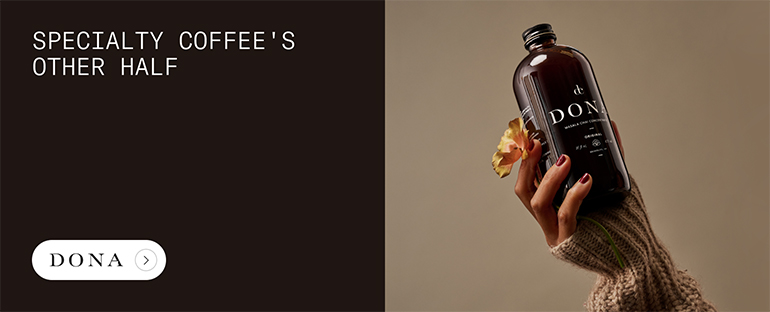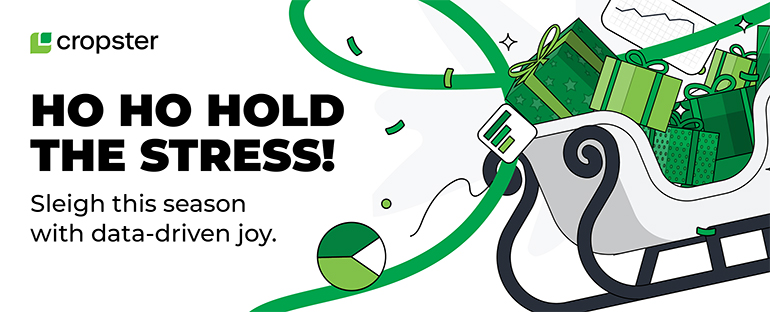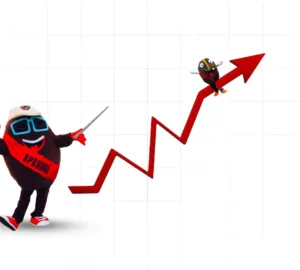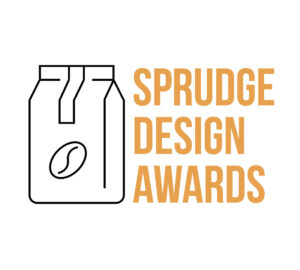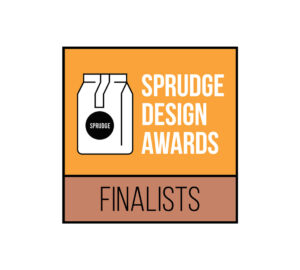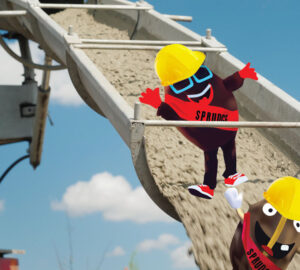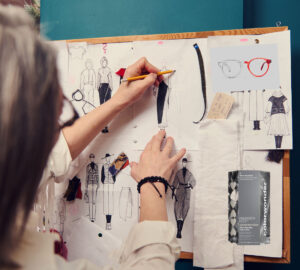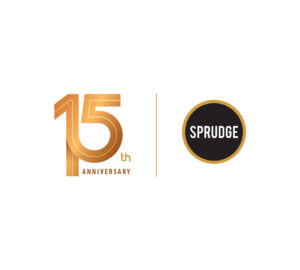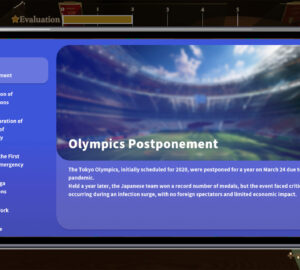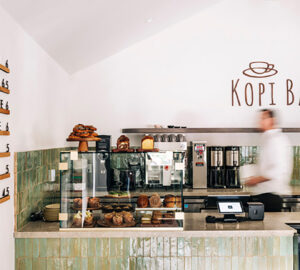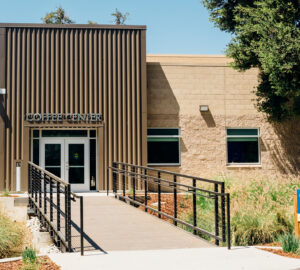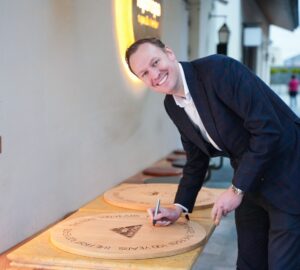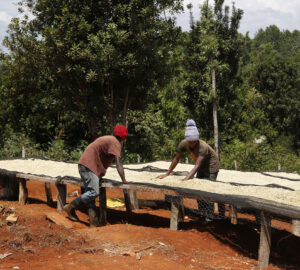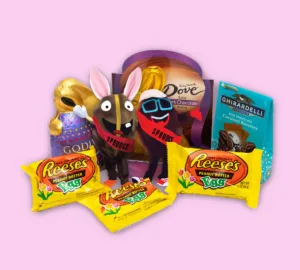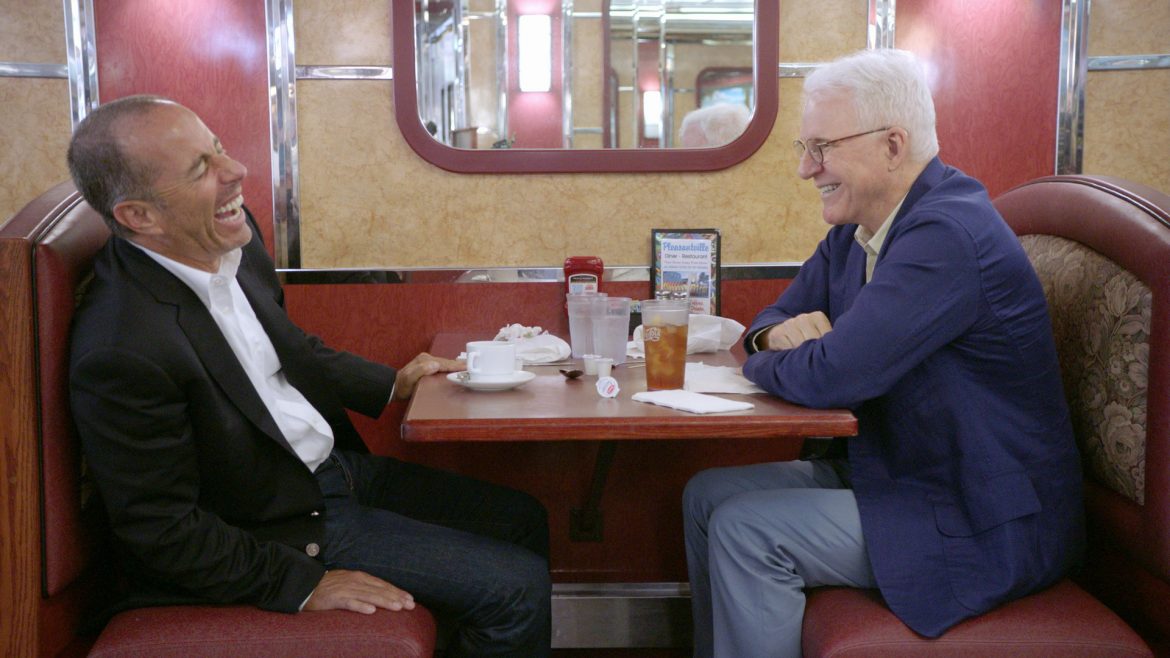
Fans of coffee, comedy, and beautiful vintage cars, rejoice! All nine seasons of Jerry Seinfeld’s “Comedians In Cars Getting Coffee” are now available for your binging pleasure on Netflix, with a new season due out later this year.
We’ve been fans of the show for years here at Sprudge and those hours of viewership served us well when, in the first week of 2018, the team at Netflix reached out with the opportunity to interview Mr. Seinfeld himself. There was just one catch: Because of wild weather on the east coast wreaking havoc on travel logistics schedules, the interview would need to take place at 3:15 AM, Pacific Standard Time.
Gratefully assisted by—you guessed it—a cup of coffee or three, Sprudge co-founder Jordan Michelman spoke with Jerry Seinfeld in the wee hours of the morning last week. It was worth it. Check out the complete interview below, and enjoy all nine seasons of Comedians In Cars Getting Coffee up now on Netflix.
This interview has been lightly edited and condensed for clarity.
Jerry Seinfeld: Hi, Jordan.
Jordan Michelman: Hello, Jerry. Mr. Seinfeld, it’s nice to meet you.
Seinfeld: It’s great to chat with you. Thank you for extending yourself so heroically to do this.
Michelman: It’s my fault for living on the west coast.
Seinfeld: I love Portland more than almost any town in America. I think it’s a great choice.
Michelman: Hey, that’s a great compliment. I just recently rewatched your episode with Fred Armisen shot here. I live walking distance to that cafe, Coava Coffee, that you two went to on that episode.
Seinfeld: Yes.
Michelman: It’s a nice one. Hey, so thanks so much for chatting with me. We’ve been fans of the show for many years, and it’s a thrill to get to talk to you a little bit about it. I know I only have a little bit of your time, so I’m just going to kind of jump into some questions.
Seinfeld: Yeah, I think that’s what we’re supposed to be doing.
Michelman: So—it feels like since you launched Comedians in Cars back in 2012, the “Go Pro in the car” thing has inspired a lot of other people. I’m curious, do you consider Comedians in Cars a talk show? What do you call this kind of show?
Seinfeld: For me, I think of it as a comedy video, is what I think of it as because that’s based on talk, but also I wanted the video to have color, and flavor, and movement. What I hate about the talk show is two people just planted in front of a backdrop that doesn’t do anything. Comedians have so much fun when they’re moving around.
I’ve spent my life with comedians just doing what I do on the show. What I tell editors who are starting to work on the show that either the camera is moving, or the car is moving, or the coffee is moving, or someone is saying something funny. There has to be some reason for every shot. We can’t have any dead air. To me, I could kind of think of it as a kind of video lozenge. I wanted to compress entertainment into something more portable and more consumable. When you watch a regular show that have these normal lengths, you’ve got to wade through a lot to get to the entertainment. As a stand up comedian, I’ve always been my kind of principle of get to the funny part as soon as you can.
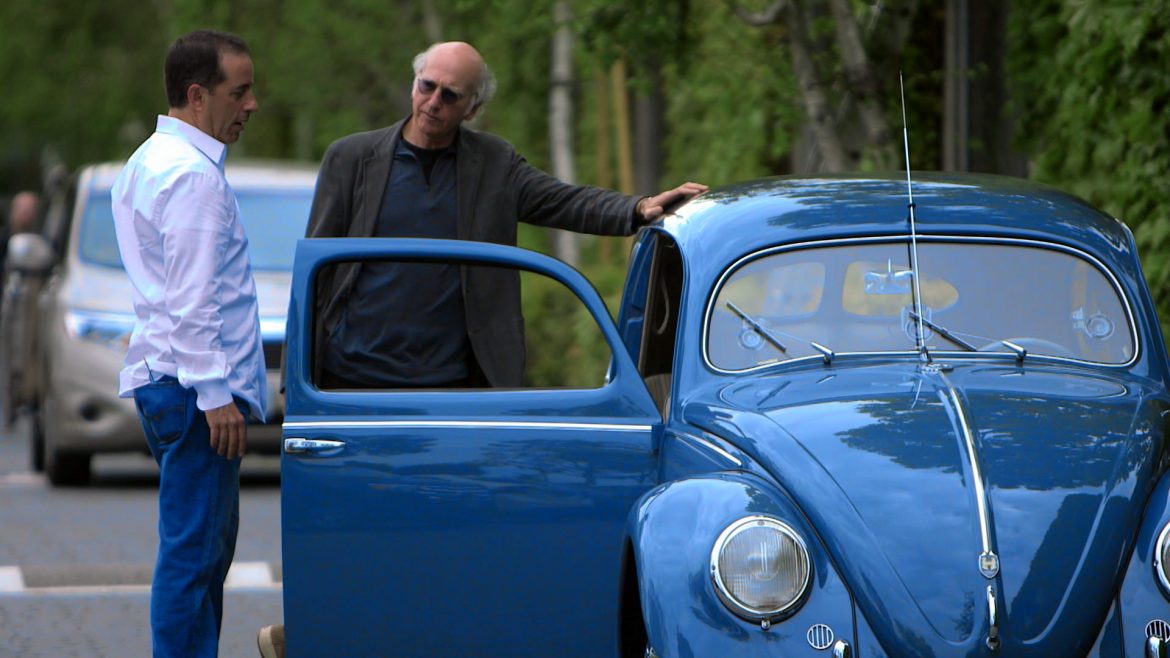
Michelman: Waiting to chat with you tonight, I watched through a couple of old episodes, and I don’t think it struck me the first time through watching some of the show, but I really admire the gift of pairing people with cars. It’s almost like a wine pairing.
Seinfeld: Yes, it is.
Michelman: Like the ’63 Corvette Stingray that you paired with Obama, it’s perfect. Or the Italian orange Lamborghini that you pair with Chris Rock—it’s like Chris Rock in car form. It’s perfect.
Seinfeld: Yeah.
Michelman: What’s that process like? How do you develop that for the comedians that you’re going to have on the show?
Seinfeld: Well, I’m very tuned into the comedians, obviously, and I’m very tuned in to cars. To me, cars are like people. They’re more interesting than most people, to be honest. Each one is an attempt to create a companion. A car is a companion that is also a practical tool. No car isn’t trying to be something. The cars that aren’t trying to be something, that’s the majority now, which is why I only use classic cars. They’re not trying to be anything. I feel like the world has become a grayer place without interesting cars to look at when you’re outside your house. Every car, to me, has a very distinct and strong personality, if it survives and becomes a classic.
Michelman: Do you have a pairing that’s a personal favorite from the first nine seasons?
Seinfeld: Oh, that’s a good question. See, if there’s 59 shows, that would be a lot to Rolodex through in my head, but you mentioned the ’63 Stingray for Obama. Obviously, I really, really, wanted to get that one right because I knew I was getting a very unique opportunity. I feel like I did. I wanted something American, something cool, something he would like and have fun with. That felt very good.
Kristin Wiig and the Volvo, that was great because I had no idea that she was a Volvo fanatic. There was just something about her that seemed like she would want something that’s offbeat like that. Then, she told me about her boyfriend who collects Volvos, so that one was pretty exciting. Another weird thing that’s happened is the number of times I have picked cars that were built on the same year as the guest [was born] has happened, like, 20 times over the course of the series. That’s been a weird occurrence.
Michelman: I’m a huge fan of your appearances over the years on Howard Stern, and in a recent one you told a story about how you’d only gotten into drinking coffee recently.
Seinfeld: Yes.
Michelman: So you weren’t actually drinking coffee in the coffee shop on your old show?
Seinfeld: No, never.
Michelman: So what changed? Did you have an aha moment, or what was the change?
Seinfeld: I can’t stand anything more than the phrase “aha moment,” let me just mention that. But what changed is I had kids and I ran out of time to eat with people. My whole adult life as a comedian, you wait to get hungry. Then, you find somebody else who’s hungry and you eat with them. That’s kind of how you spend the day. Then, I got married and had kids, and I didn’t have that kind of time anymore, but you can always meet someone for coffee.
Manhattan is another great coffee world. There’s obviously a coffee place every three inches. Then, I realized that the chatter of when you’re having coffee with people, and I didn’t, as crazy as that sounds, I didn’t realize that coffee makes you talk like that. As a comedian, of course I love that. Then, you could see how it flowed from there.
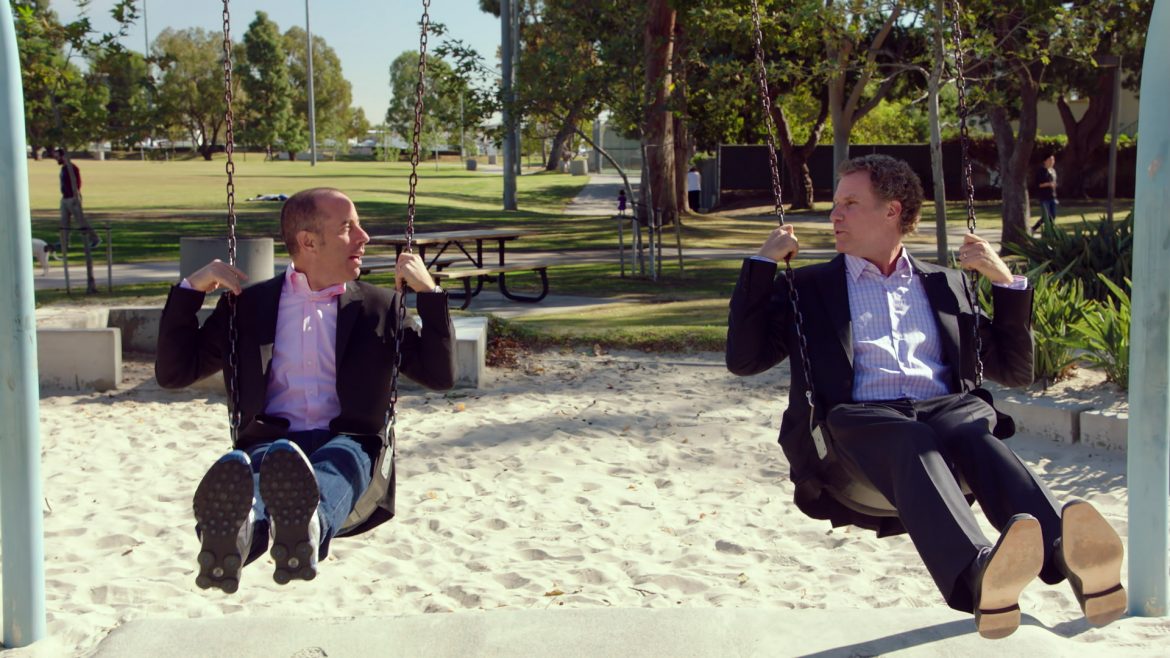
Michelman: Do you make coffee at home or do you pretty much just go out?
Seinfeld: Both, I like to do both. Anywhere, anytime. As long as it’s not weak coffee, I love it.
Michelman: Do you do espresso at home or brewed coffee?
Seinfeld: I have a Breville, the Australian espresso machine, and we also just got a Slayer. Do you know what a Slayer is?
Michelman: I do know, yes. When we started Sprudge many years ago, we were based in Seattle, which is where Slayer is based, so I know that company very well. Beautiful machines.
Seinfeld: Beautiful machines. I’m really enjoying that, we got one of those in the house recently.
Michelman: That’s really cool. But when you do go out to cafes, what’s your go to order? Are you an espresso drinker there too, or do you get a brewed coffee?
Seinfeld: Espresso’s just over a little too quickly for me.
Michelman: Sure, that makes sense.
Seinfeld: I love when coffee gets poured into a cup, because there’s really nothing else like that. They don’t do that with pancakes or pizza. They never just come by and put more on. I’ve always loved that moment. Ellen DeGeneres and I did an episode recently, and every time the guy asked me if I wanted more, I said yes. I ended up having, like, 12 cups or something. She just started to panic that I was drinking so much coffee. I explained I just hate refusing that lovely gesture. I just think it’s so nice when people just offer you more of something for free.
Michelman: You’ve probably seen at some of these cafes in New York especially, the alternative milks. Almond milk, or hemp milk. Do you ever-
Seinfeld: No.
Michelman: You’ve never tried any of that?
Seinfeld: No. Let’s be honest, they haven’t beaten a slice of pizza. I don’t care what you put on it. In New York, we have these places. They’re always trying to improve it. You can’t do it. It was perfect out of the box. Coffee with cream or milk, if you don’t like cream. Go ahead, try and beat it. You’re not going to do it.
But you can change it up. I had a Starbucks holiday blend the other day, and it was fun. Had some different flavors, but you don’t … People just have really clevered themselves out of the business in so many things, so much food. I had dinner last night at this place. I was with a food writer and my wife, who is obviously very expert in all kinds of food. We just started talking about food has become an exhausting experience. People are trying so hard to impress you. They’re wearing us out. The emotional neediness of food people and in coffee, too. Stop, just get it right.
Michelman: Yeah, I can’t argue with that.
Seinfeld: Israel has great coffee, so much great coffee there. You know that really grainy stuff that separates out into different layers?
Michelman: Sure.
Seinfeld: It’s tremendous, but honestly the best cup we had was at the airport. It had the best flavor.
Michelman: Oh yeah? But really strong through, right? That’s the tradition there in Israel?
Seinfeld: Really strong, yeah.
Michelman: I wanted to ask, most of the places that you go to on the show are diners, or coffee shops in the classic coffee shop sense where you can order food, and there’s a menu, and you have a waiter, and stuff.
Seinfeld: Yeah.
Michelman: But you do sometimes go to some of the more kind of new, high end cafes—the kinds of places we usually write about on Sprudge. So I’m curious, do you go to the more high-end espresso bar kind of places in your normal life in New York? Or do you pretty much just go to diners?
Seinfeld: In my normal life, I will seek out the high end. As much as I just complained about it, the coffee is better there. I like seeing people obsess, even though it irritates me at a certain point. So yes, if it’s not too far to get to, I will seek out the more elaborate coffee place.
How did you get into this? What you’re doing?
Michelman: My buddy and I, Zachary, who I own Sprudge with, we grew up together. We’ve known each other since we were 14, we met on the first day of eighth grade.
Seinfeld: Right.
Michelman: When we graduated high school, he went and worked in high end cafes out on the east coast in New York City, managed some cafes in New York City. I went to college, and played some music, and kind of was a bum in the first half of my 20s…I played music and was busboy. He ended up moving back to Seattle where I was living, and had this idea of like, “Hey, there’s all these great websites that are coming out.” This is, like, in 2008, 2009. “But there’s not a really great website for coffee yet, so do you want to help me start it?” When it started, it was sort of just headlines and jokes.
Seinfeld: I see.
Michelman: But yeah, we just kind of stumbled into it. Coffee’s one of those things where people have only really recently cared about it as a culinary thing or as a high kind of cultural thing. I feel like coffee, historically, has always been sort of utilitarian. People caring about it enough to do like what you’ve done, which is make a whole show kind of oriented around it, or to make a whole website oriented around it—it’s a fairly recent thing.
Seinfeld: Am I the first person to make a whole show about it?
Michelman: Yeah, I think so. You’re not the first person to make a show where a coffee shop was the central location, but I think you’re the first person to make…you know, coffee is like a character in your show.
Seinfeld: Right, yeah.
Michelman: So yeah, I think it is the first show about it. I think that’s fair to say.
Seinfeld: Oh, that’s cool. How many cups of coffee a day do you drink?
Michelman: It depends on the day. If I’m traveling for work and I’ve got to visit a half dozen cafes because I’m just in the city for the day and we’ve got to run around and see everybody, it can be a lot. It might be 10 or more.
Hey so we have time for just one last question—reflecting on the 9 seasons of your show, two of my favorite episodes are the ones with Don Rickles and Garry Shandling, brilliant and influential comics who have passed away since those episodes were taped. And I wondered—is there anybody else you wish you could’ve had on the show who is no longer with us?
Seinfeld: Oh my god, that’s a very, very long list of those people, from my friend George Carlin back to Charlie Chaplin. Comedy is my endless way of life obsession, so that’s a very long list.
Michelman: Alright well, than you so much—I’ve got so much more to ask but I know you’ve got to go, so thank you, we all really appreciate your time.
Seinfeld: Thanks, Jordan.
All photos courtesy Netflix.
Jordan Michelman is a co-founder and editor at Sprudge Media Network. Read more Jordan Michelman on Sprudge.














